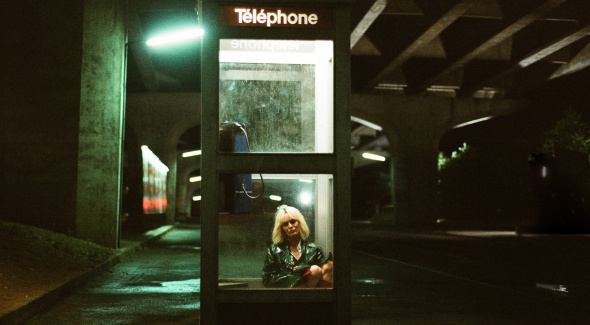Yann Gonzalez
Yann Gonzalez was born in Nice in 1977. Music, love of cinema and of actors (among them Kate Moran, Nicolas Maury, Vanessa Paradis, Niels Schneider and Eric Cantona) are at the heart of his films, which interlace desires and genders, colour and black and white, dream and mel-ancholy, theatricality and romanticism. Since his very first short film, By the Kiss, in 2006, the theme of the kiss runs through his work, infusing even his two long films, Les Rencontres d’après minuit en 2013 and Un Couteau dans le cœur en 2018. As if each of his films proposed a more or less narrational collage around the embrace and its tender, unquiet or monstrous variations. At Le Fresnoy, he will explore his obsessions even more radically in the project for a porn musical.
We are rational animals. Our first reflex when we observe a work of art is to try to rationalise it, to channel it through our knowledge and our prejudices, seeking to offset the dread that art may cause. With the films of Yann Gonzalez it’s different. They hit you in the gut, the most aesthetic part of the human being. He does not try to explain society, relationships, the night, but invites us to feel them. In contrast with a style of cinema that is ever more explanatory and well-behaved, Yann’s night envelops us in red and blue. It guides us through the shadows of the metropolises, the place of all the sins that the city itself cannot digest.
Gonzalez’s references are diverse and numerous. There is no “model to repeat,” no filmmaker to imitate; there is art, and the will to soak up as much of it as possible. So, he devours and shat-ters references in order to infuse his films. Here and there, we find traces and vestiges of inspira-tions, all explicit and easily identifiable. But like a mixer without a lid, Gonzalez imbibes, stains and spreads his ground-up idols in a fragmented cinema behind which is hidden the immediacy of an author.
Gonzalez’s creative world is the world of the night. A night in which the bodies blend into the process of a narrative, in which physique is of little or no importance when faced with the flesh. In Les Îles, we see how a deformed creature gets into bed with a couple. Later, in the same film, we see a park become the scene of a collective night-time masturbation session: violent images for specta-tors whose prejudices are confronted with purely hedonistic sequences. There are no differences in Gonzalez’s films: all are united by pleasure.
If pleasure is the finality of life, then there is no room for possessive thoughts. For example, the love between Anne and Loïs in Un couteau dans le cœur cannot flourish because it implies possession of the loved one, just as, at the begin-ning of the orgy in Les Rencontres d’après minuit, Ali reminds Matthias that “tonight you cannot be jealous.” Freedom to self-define and self-explore. We are the only ones who can define ourselves in accordance with what we feel, and the only ones to be in charge of our bodies and our actions. Strangers are, and will always be, others.
By the Kiss shows us the phenomenon of passion in a loop: against a wall, a woman gives herself to several lovers, not even taking the time to breathe. Pleasure soon becomes pain. She stops giving but is taken. Gonzalez’s cinema oscillates like a metronome between pain and pleasure. Again and again. Just as we can go on talking, again and again, about the night, about sex, about the violence of an underground that is by essence Dionysian. We can always go on trying to label the indescribable and respond negatively to a hyper-aesthetic experience of which pleasure is the ultimate goal. But if you know the password you can cross the threshold and enter this bizarre, unique place where, in the darkness, the most carnal and animal part of you will be accepted.
Long Live Lust
Brais Romero Suárez

